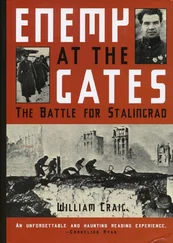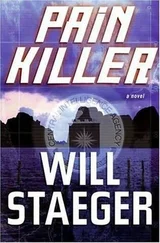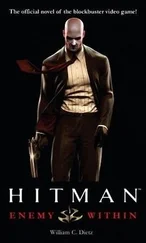The call letters of the local station appeared above the word NewsFile in the lower-left corner of the screen.
“It’s file footage from the local station, dated December 1994. We’ll play the whole clip for you, but this is the part that matters, when the videographer zooms in. I believe U.S. policy was the same then as now-‘wet feet, dry feet.’ If a Cuban refugee makes land here, he’s eligible for asylum. If he’s picked up en route before he makes it in, the Coast Guard has to send him back. These guys made it-by the end of the clip they all climb onto the dock and out of frame. There.”
Knowles pointed to the monitor as the image zoomed in, and six or seven of the men’s faces could be seen more distinctly. In another second or two, a brightened circle of the kind Laramie had seen on police-chase reality shows spotlighted one of the men, and the video image froze.
Even with the granularity of the station’s old footage, Laramie had no problem recognizing the face.
“That’s him,” she said.
Knowles nodded. “Search engine scored the hit about two hours ago. I had an alarm rigged for when the system found a match. Woke up, checked it out, and got Cole in here the minute I saw what you just watched.”
Laramie heard Cole wrapping up his phone call-something about “Thanks, I owe you one”-then he hung up and came over.
“If it’s December of ninety-four,” she said, “that’s only a month or two before Achar showed up in the first Florida docs.”
“Yep.” Knowles eased back in his seat, looking somewhat overwhelmed with self-satisfaction.
“He was Cuban, then,” she said. Then she thought about this some more. “Or at least he came here from there.”
“Yep,” Knowles said again.
Cole had come over to stand silently above them.
“Castro’s last-ditch effort to take down the capitalist pigs up north,” Laramie said, “seems an unlikely version of this conspiracy at best. No way he cares enough anymore. Or has the resources.”
“We’re in agreement on that,” Knowles said. “But the guy may still have been Cuban.”
Laramie said, “Maybe. But somebody could have dumped the raft in the water, or put the people on it, to make it seem that way.”
Knowles nodded. “Could have,” he said. “Of course that’s not the only clue this image gives us.”
Laramie had the idea they’d been through all of this before he’d come to get her, and decided she was irritated they hadn’t called her over immediately. Though maybe they’d wanted to do some follow-up first-have some “show rather than tell” ready for her by the time she came down the hall.
“The other people on the boat,” she said, her brain starting to click.
“Right.”
“If we search in the other direction,” she said, “working from the faces on the boat, then maybe we find some other sleepers.”
Cole nodded.
“Already under way,” he said. “Been dipping into some of the data banks your friend the guide knows how to get into. Once we got some hits on the faces-meaning matches with photos in the federal or local databases Wally and I plugged into the search engine-we were able to determine that two of Achar’s pals aboard the boat were busted for armed robbery-manslaughter charges were part of it too-and sent to prison in Dade County in 1997. Two others have been in and out of jail for smaller crimes, possession and so on, for most of the eleven years since they came over. We’re shooting for some other angles, but so far it looks like nobody else on the boat can be shown to have stolen the identity of somebody who died. At least not yet. It’s a maze-we need to find each man’s Social Security number from a starting point of his image on that tape, then check whether the Social registers as one belonging to somebody who’s already dead. Like we talked about, almost none of this kind of thing is kept electronically, but we’re starting that way just in case-it’s faster than our other search method if it works.”
Laramie looked at the image on the monitor and counted-twenty-two men on the boat.
“We’re checking for other boats from the same time period too?”
“Yep,” Knowles said. “And the search engine’s still working on the other faces from this boat. Assuming the search comes up dry, all this really means is that our pal, public enemy number one, doesn’t appear to have shipped all of his sleepers over on one boat, all at once. Assuming there’s more than one.”
Laramie nodded. “Suppose it was too much to expect for ten of them to be caught on tape, all on the same boat.”
Knowles looked at Cole, who nodded his affirmation of something.
“It’s late,” Knowles said, “but we’re up. We were thinking we’d give you the other updates now, get back to sleep, then get back on it around nine or ten A.M.”
Laramie had planned to do a roundtable at eight, to include Rothgeb, and maybe even Cooper by phone. Now she might just have something for Cooper to do. There might be some investigative work to be done in Cuba-work up a notion with Eddie Rothgeb on what sort of “Americanization facility” he should be looking for, then send Cooper on his way.
Maybe I could even go with him.
She immediately became infuriated with herself for thinking this final thought, and nodded quickly at Knowles in a vain attempt to expel it from her brain.
“Go ahead with your update,” she said.
Cole retreated to his seat by the phone and started in.
“Been interviewing, interrogating, and otherwise hassling every name that popped up in the terror book,” he said. “Plus a few more that didn’t. If you care, I think my tally is up to fifty-two interviews so far, and I’ve set another fourteen for today. Besides the fact that most of these conversations are basically putting me to sleep, I’m on to something-some kind of pattern, I think-I’m just not sure what. There are some consistent, and unique, pieces of his weekly routine-two events per week, I believe-which may have served as the ‘bread crumbs’ we’ve been speculating he may have left. I’m just not positive my theory makes sense yet.”
Laramie considered this for a moment but couldn’t grasp how it would work.
“You’re saying he might have left messages in those places?” she said. “In the bar where he hung out with his buddies on Thursday nights, or-”
“Yes and no,” Cole said. “Probably not literally. And not that obviously. But what I was thinking is, it might be in the numbers of the get-togethers.”
Knowles said, “Fourth day of the week at seven, for instance.”
“Right. I’ll have more today after I wrap up the circuit of interviews, but if I’m right-if he’s trying to give us a couple sets of numbers as the clue-then this guy was very, very good. For example, I’ve found no evident ‘confessions’ like we talked about before, and that’s pretty rare. Almost contrary to human nature if you’re talking ten years of undercover work. Even cops love to give themselves away to anybody who’s smart enough to figure it out. I’ll give you an example: I met a guy once who’d done some undercover work, and the name they gave him in his cover job on the docks was ‘Bobby Covert.’”
“As in covert operations?” Laramie said.
“One and the same.”
“You’re telling me nobody figured it out?”
“Nope-the guy busted a whole tier of New Jersey organized crime chiefs while working undercover at a trucking company under that name the whole time.”
“You said there were two pieces of his routine,” Laramie said, her mind a few lines back.
“Yeah,” Cole said. “That’s what I’m thinking. But I’m not positive.”
“Involving numbers?”
“I think it’s twice per week that he set regular appointments he never broke, but I haven’t boiled down the consistent, well-I guess you’d say least common denominators of the get-togethers. You know, which pieces, such as time of day, that might give us a code from the weekly arrangements he made.”
Читать дальше





![Томас Гарди - Джуд неудачник [Литрес, Public Domain]](/books/437392/tomas-gardi-dzhud-neudachnik-litres-public-domain-thumb.webp)






